Question: For your first project, write a C program (not a C++ program!) to read in a given list of non- negative integers and store them
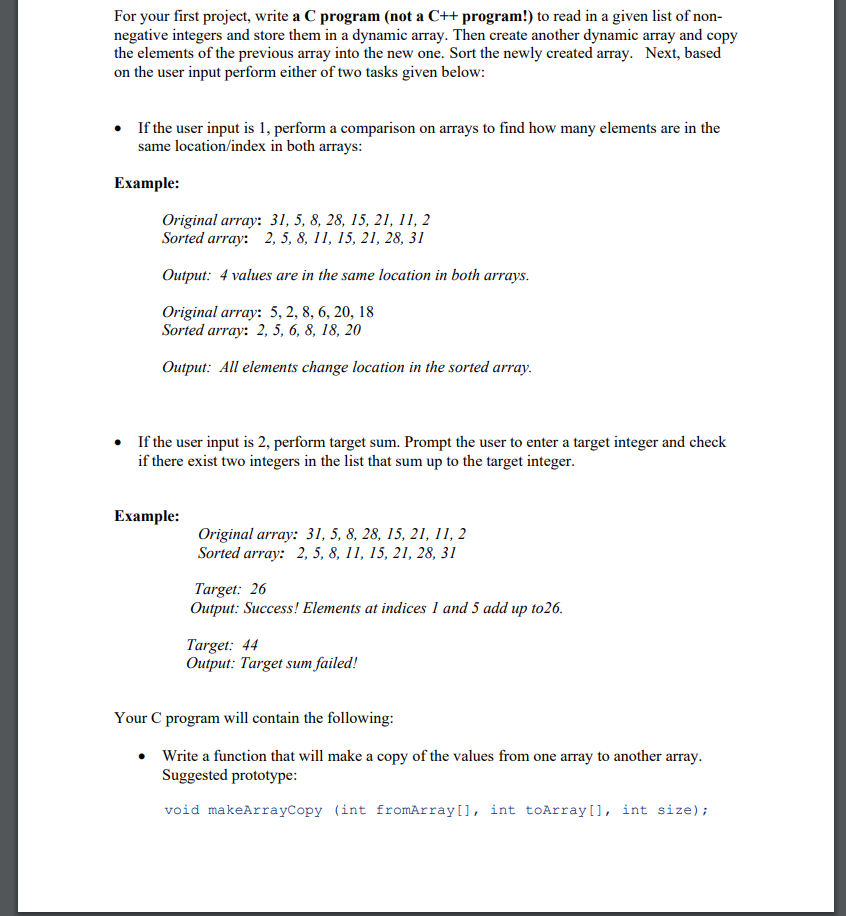
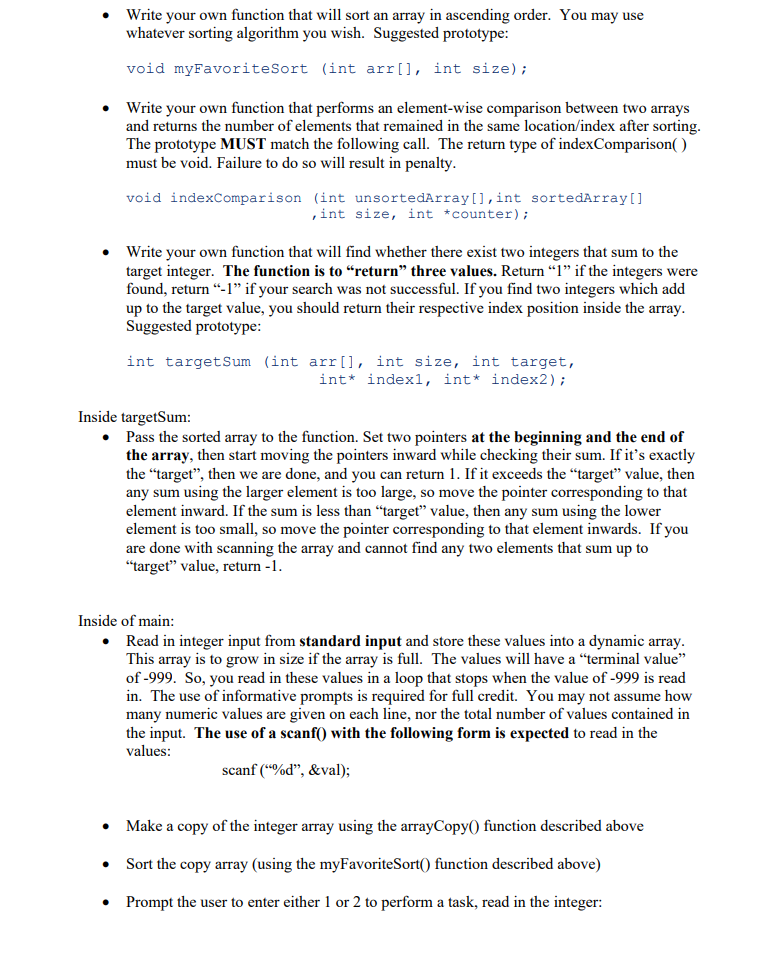
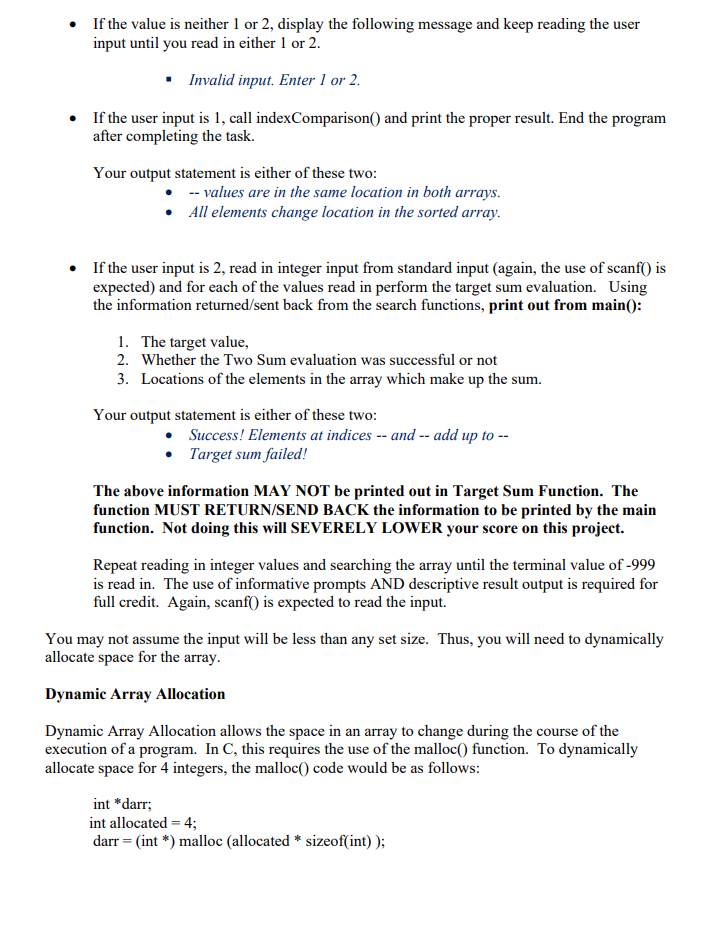
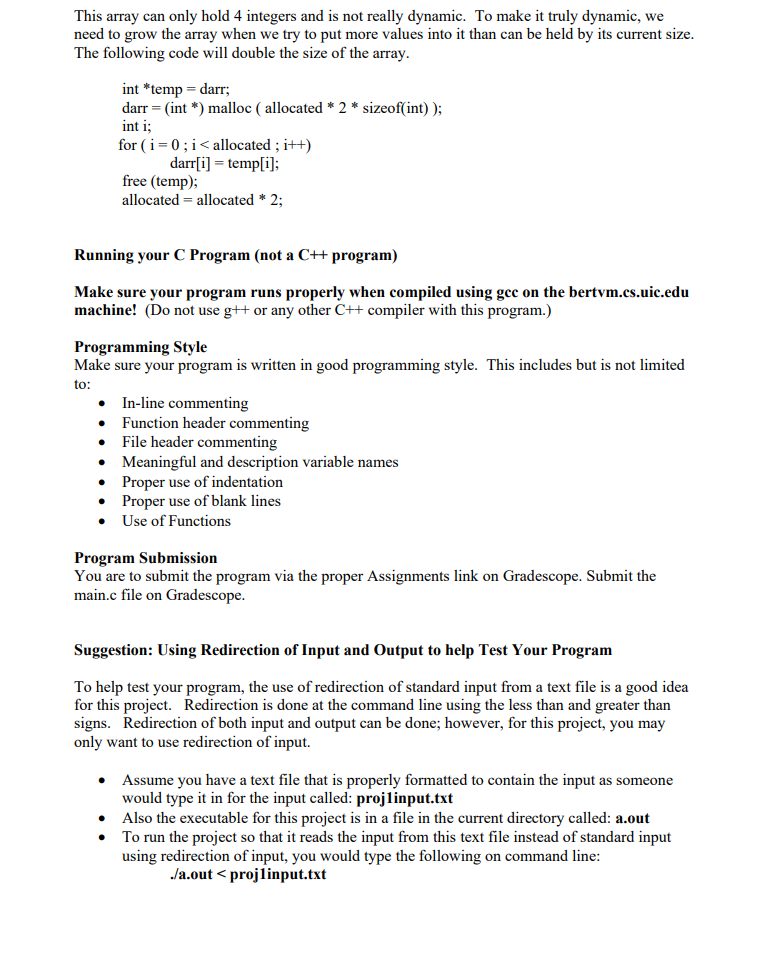
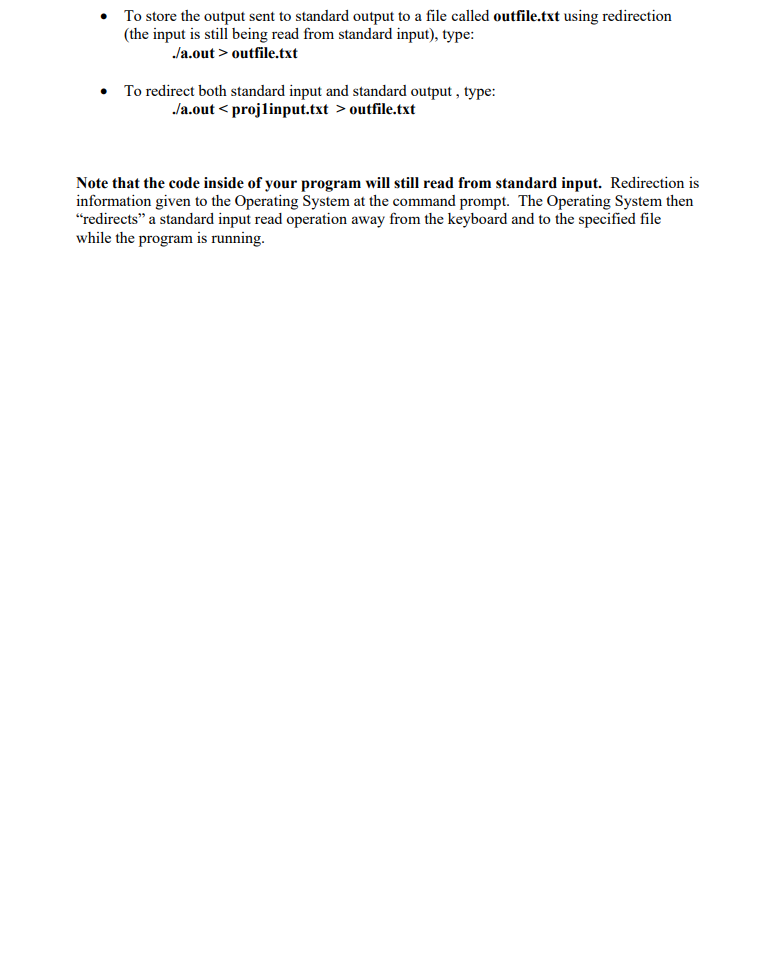
For your first project, write a C program (not a C++ program!) to read in a given list of non- negative integers and store them in a dynamic array. Then create another dynamic array and copy the elements of the previous array into the new one. Sort the newly created array. Next, based on the user input perform either of two tasks given below: If the user input is 1, perform a comparison on arrays to find how many elements are in the same location/index in both arrays: Example: Original array: 31, 5, 8, 28, 15, 21, 11, 2 Sorted array: 2, 5, 8, 11, 15, 21, 28, 31 Output: 4 values are in the same location in both arrays. Original array: 5, 2, 8, 6, 20, 18 Sorted array: 2, 5, 6, 8, 18, 20 Output: All elements change location in the sorted array. If the user input is 2, perform target sum. Prompt the user to enter a target integer and check if there exist two integers in the list that sum up to the target integer. Example: Original array: 31, 5, 8, 28, 15, 21, 11, 2 Sorted array: 2, 5, 8, 11, 15, 21, 28, 31 Target: 26 Output: Success! Elements at indices 1 and 5 add up to26. Target: 44 Output: Target sum failed! Your C program will contain the following: Write a function that will make a copy of the values from one array to another array. Suggested prototype: void makeArrayCopy (int fromArray[], int toArray[], int size); Write your own function that will sort an array in ascending order. You may use whatever sorting algorithm you wish. Suggested prototype: void myFavoriteSort (int arr[], int size); . Write your own function that performs an element-wise comparison between two arrays and returns the number of elements that remained in the same location/index after sorting. The prototype MUST match the following call. The return type of indexComparison must be void. Failure to do so will result in penalty. void indexComparison (int unsortedArray[], int sortedArray[] ,int size, int *counter); Write your own function that will find whether there exist two integers that sum to the target integer. The function is to "return three values. Return 1 if the integers were found, return"-1" if your search was not successful. If you find two integers which add up to the target value, you should return their respective index position inside the array. Suggested prototype: int targetSum (int arr[], int size, int target, int* indexl, int* index2); Inside targetSum: Pass the sorted array to the function. Set two pointers at the beginning and the end of the array, then start moving the pointers inward while checking their sum. If it's exactly the "target, then we are done, and you can return 1. If it exceeds the "target" value, then any sum using the larger element is too large, so move the pointer corresponding to that element inward. If the sum is less than "target" value, then any sum using the lower element is too small, so move the pointer corresponding to that element inwards. If you are done with scanning the array and cannot find any two elements that sum up to "target" value, return -1. . Inside of main: Read in integer input from standard input and store these values into a dynamic array. This array is to grow in size if the array is full. The values will have a "terminal value" of -999. So, you read in these values in a loop that stops when the value of -999 is read in. The use of informative prompts is required for full credit. You may not assume how many numeric values are given on each line, nor the total number of values contained in the input. The use of a scanf() with the following form is expected to read in the values: scanf("%d", &val); Make a copy of the integer array using the arrayCopy0 function described above Sort the copy array (using the myFavoriteSort() function described above) Prompt the user to enter either 1 or 2 to perform a task, read in the integer: If the value is neither 1 or 2, display the following message and keep reading the user input until you read in either 1 or 2. Invalid input. Enter 1 or 2. If the user input is 1, call indexComparison() and print the proper result. End the program after completing the task. Your output statement is either of these two: -- values are in the same location in both arrays. All elements change location in the sorted array. If the user input is 2, read in integer input from standard input (again, the use of scanf() is expected) and for each of the values read in perform the target sum evaluation. Using the information returned/sent back from the search functions, print out from main(): 1. The target value, 2. Whether the Two Sum evaluation was successful or not 3. Locations of the elements in the array which make up the sum. Your output statement is either of these two: Success! Elements at indices -- and -- add up to -- Target sum failed! The above information MAY NOT be printed out in Target Sum Function. The function MUST RETURN/SEND BACK the information to be printed by the main function. Not doing this will SEVERELY LOWER your score on this project. Repeat reading in integer values and searching the array until the terminal value of -999 is read in. The use of informative prompts AND descriptive result output is required for full credit. Again, scanf() is expected to read the input. You may not assume the input will be less than any set size. Thus, you will need to dynamically allocate space for the array. Dynamic Array Allocation Dynamic Array Allocation allows the space in an array to change during the course of the execution of a program. In C, this requires the use of the malloc() function. To dynamically allocate space for 4 integers, the malloc() code would be as follows: int *darr; int allocated = 4; darr = (int *) malloc (allocated * sizeof(int)); This array can only hold 4 integers and is not really dynamic. To make it truly dynamic, we need to grow the array when we try to put more values into it than can be held by its current size. The following code will double the size of the array. int *temp = darr; darr = (int *) malloc (allocated * 2 * sizeof(int)); int i; for (i = 0; i outfile.txt . To redirect both standard input and standard output, type: ./a.out outfile.txt Note that the code inside of your program will still read from standard input. Redirection is information given to the Operating System at the command prompt. The Operating System then "redirects" a standard input read operation away from the keyboard and to the specified file while the program is running. For your first project, write a C program (not a C++ program!) to read in a given list of non- negative integers and store them in a dynamic array. Then create another dynamic array and copy the elements of the previous array into the new one. Sort the newly created array. Next, based on the user input perform either of two tasks given below: If the user input is 1, perform a comparison on arrays to find how many elements are in the same location/index in both arrays: Example: Original array: 31, 5, 8, 28, 15, 21, 11, 2 Sorted array: 2, 5, 8, 11, 15, 21, 28, 31 Output: 4 values are in the same location in both arrays. Original array: 5, 2, 8, 6, 20, 18 Sorted array: 2, 5, 6, 8, 18, 20 Output: All elements change location in the sorted array. If the user input is 2, perform target sum. Prompt the user to enter a target integer and check if there exist two integers in the list that sum up to the target integer. Example: Original array: 31, 5, 8, 28, 15, 21, 11, 2 Sorted array: 2, 5, 8, 11, 15, 21, 28, 31 Target: 26 Output: Success! Elements at indices 1 and 5 add up to26. Target: 44 Output: Target sum failed! Your C program will contain the following: Write a function that will make a copy of the values from one array to another array. Suggested prototype: void makeArrayCopy (int fromArray[], int toArray[], int size); Write your own function that will sort an array in ascending order. You may use whatever sorting algorithm you wish. Suggested prototype: void myFavoriteSort (int arr[], int size); . Write your own function that performs an element-wise comparison between two arrays and returns the number of elements that remained in the same location/index after sorting. The prototype MUST match the following call. The return type of indexComparison must be void. Failure to do so will result in penalty. void indexComparison (int unsortedArray[], int sortedArray[] ,int size, int *counter); Write your own function that will find whether there exist two integers that sum to the target integer. The function is to "return three values. Return 1 if the integers were found, return"-1" if your search was not successful. If you find two integers which add up to the target value, you should return their respective index position inside the array. Suggested prototype: int targetSum (int arr[], int size, int target, int* indexl, int* index2); Inside targetSum: Pass the sorted array to the function. Set two pointers at the beginning and the end of the array, then start moving the pointers inward while checking their sum. If it's exactly the "target, then we are done, and you can return 1. If it exceeds the "target" value, then any sum using the larger element is too large, so move the pointer corresponding to that element inward. If the sum is less than "target" value, then any sum using the lower element is too small, so move the pointer corresponding to that element inwards. If you are done with scanning the array and cannot find any two elements that sum up to "target" value, return -1. . Inside of main: Read in integer input from standard input and store these values into a dynamic array. This array is to grow in size if the array is full. The values will have a "terminal value" of -999. So, you read in these values in a loop that stops when the value of -999 is read in. The use of informative prompts is required for full credit. You may not assume how many numeric values are given on each line, nor the total number of values contained in the input. The use of a scanf() with the following form is expected to read in the values: scanf("%d", &val); Make a copy of the integer array using the arrayCopy0 function described above Sort the copy array (using the myFavoriteSort() function described above) Prompt the user to enter either 1 or 2 to perform a task, read in the integer: If the value is neither 1 or 2, display the following message and keep reading the user input until you read in either 1 or 2. Invalid input. Enter 1 or 2. If the user input is 1, call indexComparison() and print the proper result. End the program after completing the task. Your output statement is either of these two: -- values are in the same location in both arrays. All elements change location in the sorted array. If the user input is 2, read in integer input from standard input (again, the use of scanf() is expected) and for each of the values read in perform the target sum evaluation. Using the information returned/sent back from the search functions, print out from main(): 1. The target value, 2. Whether the Two Sum evaluation was successful or not 3. Locations of the elements in the array which make up the sum. Your output statement is either of these two: Success! Elements at indices -- and -- add up to -- Target sum failed! The above information MAY NOT be printed out in Target Sum Function. The function MUST RETURN/SEND BACK the information to be printed by the main function. Not doing this will SEVERELY LOWER your score on this project. Repeat reading in integer values and searching the array until the terminal value of -999 is read in. The use of informative prompts AND descriptive result output is required for full credit. Again, scanf() is expected to read the input. You may not assume the input will be less than any set size. Thus, you will need to dynamically allocate space for the array. Dynamic Array Allocation Dynamic Array Allocation allows the space in an array to change during the course of the execution of a program. In C, this requires the use of the malloc() function. To dynamically allocate space for 4 integers, the malloc() code would be as follows: int *darr; int allocated = 4; darr = (int *) malloc (allocated * sizeof(int)); This array can only hold 4 integers and is not really dynamic. To make it truly dynamic, we need to grow the array when we try to put more values into it than can be held by its current size. The following code will double the size of the array. int *temp = darr; darr = (int *) malloc (allocated * 2 * sizeof(int)); int i; for (i = 0; i outfile.txt . To redirect both standard input and standard output, type: ./a.out outfile.txt Note that the code inside of your program will still read from standard input. Redirection is information given to the Operating System at the command prompt. The Operating System then "redirects" a standard input read operation away from the keyboard and to the specified file while the program is running








